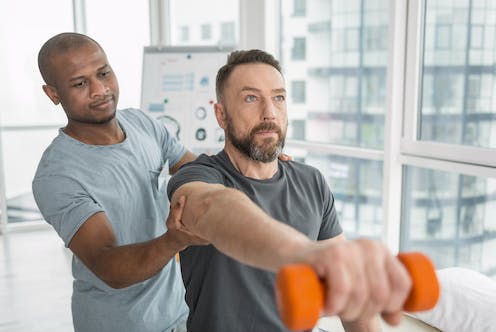
You might know that physical activity can help lower your risk of getting many common types of cancer. But what many of us don’t realise is just how important physical activity is if you’ve been diagnosed with cancer.
While patients were previously told to rest during cancer treatment, the overwhelming body of evidence now shows that physical activity is safe and beneficial throughout cancer treatment and beyond. The World Health Organization also endorses physical activity for those with chronic conditions, including cancer.
Here are five ways physical activity could be beneficial to patients during and after cancer treatment.
Table of Contents
1. It supports mental health
A cancer diagnosis can be extremely emotional, and patients may feel uncertainty and fear regarding their diagnosis and treatment. Research shows that many patients experience increased feelings of anxiety and depression, alongside reduced quality of life. This may occur just after diagnosis, during treatment and in some cases is experienced for years after the completion of treatment.
But many studies have shown that physical activity during and after cancer treatment can help manage these mental health struggles, alongside improving patients’ self-esteem and overall mood.
Moderate-intensity aerobic exercise (such as brisk walking) two to three times a week combined with muscle strengthening (such as pilates or weight lifting) has been shown to significantly reduce anxiety and depression in people suffering with many different types of cancer, including breast, prostate, colorectal, gynaecological and lung cancer.
2. It may reduce feelings of fatigue
Fatigue is one of the most frequently reported side effects associated with cancer and its treatment, which can have a serious affect on a cancer patient’s daily life and their physical, emotional and mental wellbeing.
Research shows regular physical activity can help reduce feelings of fatigue. Evidence suggests that moderate to vigorous-intensity activity which combines both aerobic and muscle strengthening activities two to three times a week is beneficial for reducing fatigue in those diagnosed with breast and prostate cancer.
3. It can help to cope with treatment
Many studies have shown that patients who are able to tolerate their prescribed dose of chemotherapy have a better prognosis. However, the dose of chemotherapy patients receive is often reduced due to a range of treatment-related side-effects and complications they experience.
Encouragingly, some studies suggest that breast cancer patients who completed muscle-strengthening or a combination of both aerobic and muscle-strengthening activities during treatment were less likely to need chemotherapy dose reductions. The evidence for a link between physical activity and chemotherapy is still emerging and research is ongoing.

Dejan Dundjerski/ Shutterstock
4. It may prevent hospitalisation
Treatment for cancer, including surgery and chemotherapy, can lead to complications for some people, which may require hospitalisation. But research suggests that for patients with breast cancer physical activity can lower the risk of hospitalisation.
Researchers asked participants to take part in a 16-week programme of combined muscle strengthening and interval training which was performed twice a week during chemotherapy. They found that the group which performed a combination of strength and interval training had a 3% lower incidence of hospitalisation compared to those who were inactive.
5. It could reduce risk of recurrence and improves survival
A large review of 18 reviews of physical activity among those with cancer found that higher physical activity levels was associated with a reduced risk of cancer returning, and improved survival by up to 40%-50%.
Time to move
Many patients with cancer avoid physical activity as they’re unsure of what it safe for them to do. But the World Health Organization recommends that all patients with cancer should avoid being inactive both during and after treatment.
Instead, it says adult cancer patients should aim to complete at least 150 minutes of moderate intensity physical activity each week that raises the heart beat (such as brisk walking, cycling and dancing). It also recommendeds that patients aim to do muscle strengthening exercises (such as weight lifting or yoga) at least twice a week.
While it can often be difficult to schedule in time to be physically active – especially during treatment – even small amounts of physical activity interspersed during the day are important for health. Some easy ways to include more activity into your day include getting off the bus a stop early or squatting while waiting for the kettle to boil. This form of activity may also be useful for cancer patients who are feeling fatigued, as it only requires a few minutes at a time throughout the day.
For those having cancer treatment, it’s important to remember that some days will be better than others. Take it easy on the days you feel unwell. On the days you’re feeling a bit better, try to increase the amount of exercise you do just a little.
It’s important to stay hydrated, not to overdo it and listen to your body. You may find being active more enjoyable if you involve friends and family.
![]()
Amanda Daley receives funding from National Institute of Health Research (NIHR). The views expressed are those of the authors and not necessarily those of the NHS, the NIHR or the Department of Health and Social Care.
Kajal Gokal does not work for, consult, own shares in or receive funding from any company or organisation that would benefit from this article, and has disclosed no relevant affiliations beyond their academic appointment.























